|
Introduction
This chess match between George Mackenzie and Max Judd of 13 games was held in St. Louis, Missouri commencing on the 31st of January 1881 (1) and concluding on 30th of April 1881 (2) This was a match between Mackenzie, the pre-eminent active American player (3) and three-times US Champion and Judd, the strongest player in St Louis. Both had competed in the 5th American Chess Congress, New York (1880), and according to Chessmetric's analysis: Mackenzie was 3rd and Judd eleventh on its March 1881 rating list. (4) Mackenzie (43 y.o.) and Judd (29 y.o.) played the match in a relaxed manner. There was an interruption to the match and the fourth game was adjourned "for some weeks on account of the departure of Captain Mackenzie from St. Louis on a visit to New Orleans, the birthplace and present abode of Paul Morphy "(5) At the time, the chess scene in St. Louis was noted to be thriving under the direction of Mr Judd, its chess and whist club having 400 members (6). This was a reflection of the city's growing economic power. St. Louis enjoyed rapid growth after the Civil War, becoming the fourth largest city in the United States "We learn from the St. Louis Globe-Democrat that a match has been arranged between Captain Mackenzie and Max Judd, under the following conditions: the winner of the first seven games to be the victor; drawn games not to count; time limit, <15 moves per hour>; play to take place twice a week, <Monday and Saturday evenings>, as both players are engaged in business during daytime. The stakes are provided by members of the St. Louis Chess Club, who were very anxious to see a contest between the American and the Western champions. The first game was commenced at the Mercantile Library Chess Room on the 31st of January last." (7) The match took place in the chess room of the St. Louis Mercantile Library, the largest subscription library west of the Mississippi. (8) Status
It has been claimed that this match was for the US chess championship (9), but this is not evidenced by the contemporary sources. What is known is that the 5th American Chess Congress, New York (1880), held in New York on January 6th–26th, 1880 had been discredited. Mackenzie had won on a tie break over James Glover Grundy, whilst Judd was fifth. There was a scandal when newspapers ran reports that Grundy and Preston Ware fixed their game in that tournament. Ware provided written testimony to the tournament committee that in the final round opponent, Grundy, offered him $20 if he agreed to play for a draw so guaranteeing Grundy the second place prize money. Ware agreed, but complained that Grundy had instead beaten him, and by doing so, Ware had tied for first with Mackenzie. "A meeting of the Chess Association of the United States was held last evening at No. 60 East Fourteenth-street, to receive the report of the committee appointed to investigate charges of collusion against Messrs. Grundy and Ware, two of the contestants in the late chess tournament held in this City...Mr Grundy...denied the allegations made by Ware, and he said there was a conspiracy against him, in which one of the prominent members of the congress committee was implicated. The committee reported that...it believed the charges to be true..." (10) The tournament book states he "was given the benefit of a technical doubt, and a verdict of 'not proven' (11) was entered..." due to the conflicting testimony from the two parties, but Grundy's reputation was effectively ruined. (12) (13) There is neither evidence nor good reason why this match would have been a title match. Mackenzie had not been implicated in any wrongdoing which could have opened his title up for question. If any such match had been necessary, Charles Moehle, of St Paul, Minnesota and Alexander Sellman ,of Baltimore, who had been placed in third and fourth, ahead of Judd, would both have had a superior claim. Apart from the leading chess journals failing to mention the question of the national title bring at stake, the leisurely conduct of the match, with Mackenzie taking time away for a trip to New Orleans, would suggest that this was not a title match. Instead, Judd may have arranged the match in part for Mackenzie's benefit. Judd was a successful businessman and according to William Pollock "Max Judd's generosity to chess-payers and others who have tingled with the buffets of Schoolmistress Fortune will never be known … He has assisted chess-players pecuniarily whenever their wants could be conveyed to him … and he has a delicate way of doing these good deeds. The later Captain Mackenzie when in adverse circumstances at St. Louis earned a very handsome reward by his match with Judd, his opponent hedging for both sides and arranging matters so that Mackenzie neither was, nor felt himself to be in his benefactor's debt." (14) The American champion could not support himself by chess alone: "'The Turf, Field and Farm' makes the unexpected announcement that Capt. Mackenzie has left New York and established himself permanently at St. Louis, <where he is engaged in a printing office and in giving lessons in chess>..." (15) The circumstances of the match Contemporary sources agree on the arrangements for the match, but do not specify the purse. "The conditions are that the player who first wins seven games is to be the victor; draws not to count; time limit 15 moves per hour; play to take place every Monday and Saturday between the hours of 7.30 p.m. and 12 p.m. It is stated that of 13 games contested between these players since 1871, Capt. Mackenzie has won 8½ and Mr. Judd 4½, but it is supposed that the latter has improved considerably since. Play was to commence on Monday, the 31st of January." (16) "A great chess match has been commenced at St. Louis. U.S.A., between Captain Mackenzie, the American champion, and Max Judd, also a very fine player. Conditions, seven decisive games, time limit, <15 moves per hour>. The money prize for when they play is subscribed by the St. Louis players. The "Globe Democrat" says Mr. Judd expects to put on the whole chess armour, and has polished it up for the fray, for he well knows should he defeat the American champion, it would be a feather in his cap..." (17) Previous encounters "Captain Mackenzie, the American chess champion, visited St. Louis on Nov. 30 last (1878 - e.d.), and played against eleven members of the local chess club simultaneously, winning nine and losing two. In the course of his visit Captain Mackenzie played four games against Mr. Max Judd, of St. Louis, and each player scored two games." (18) For a retrospective comparative analysis of their strength see - http://www.edochess.ca/matches/m787... On the 15th of January, the opponents played an " off-hand" game in Mercantile Library Chess Room, which Mackenzie won. It is not clear whether this was as a "warm-up" or an incidental game. (19) Judd
Judd was an extremely strong amateur player, having decided that a career in business, and for a time diplomacy, was a more secure option than playing chess for a living. "In 1871 he won fourth prize at the Cleveland International Tourney; third at Chicago, in 1874; second at Philadelphia, in 1876; fifth at New York, in 1880…For several years he was President of the St. Louis Chess Club…In none of his matches against St. Louis players was Mr. Judd ever defeated. In 1874 he won a match from the then well-known Italian master, Edward Alberoni, by the score of six games to three… Taking into account all the characteristics of Mr. Max Judd's play — its solidity, its depth, its quick grasp of the strategic possibilities of a position, and so, too, its frequently manifested capacity for the achievement of the brilliant in the game — there could be no question but that he belonged to the ranks of the undoubted masters..." (20) Judd had competed in four successive American Chess Congresses achieving solid results, 4th in a field of 9 in Second, 3rd of 8 in the Third, 2nd of 9 in the Fourth and 5th of 10 in the Fifth. Pollock, himself a strong master, gave his assessment of Judd's style in 1892: "His style is classical, solid, profound, deeply analytical and uniformly cautious, often too far-seeing to admit of brilliancy or dazzling speculative plunges into depths beyond mere mortal ken. His knowledge of the Openings is extensive, and he has not played enough "bad chess" to weary of the beauties of the strongest and most familiar methods of debut, consequently we do not find him indulging in freakish innovations, " corkscrew " gambits, weak early moves adopted for the sake of stimulating his genius to fight against self-inflicted odds, Balaclava charges, double gambits, "rat-hole" defences, improvisations or empiricisms. He is a beautiful end-game player, and there is plenty of "Polish" in his finishing and finished touches." (21) Mackenzie
In 1863, Mackenzie had emigrated from the United Kingdom to the United States. After fighting in the Civil War for the Union, he became a professional chess player. He was to dominate American tournaments for the next thirty years. Mackenzie won the first prize at 2nd American Chess Congress, Cleveland (1871) , the 3rd American Chess Congress, Chicago (1874)
and the 4th American Chess Congress, Philadelphia (1876) . "It will be seen...that the champion has not snatched his laurels by the grace of any mere freak of fortune... His success has been gained, rather, as the fruit of long and patient effort..." (22) It can be seen from the newspaper reports quoted here, that being a chess professional in America at this time was a difficult and precarious existence, and Mackenzie had to take miscellaneous jobs to subsist. Tournaments were irregular and the prizes were not especially generous. Chess was regarded as the preserve of a 'gentleman', but Mackenzie's prize at the Fifth American Chess Congress (1880) was less than the annual wage of a skilled tradesman in regular employment (23). He had to rely on winning staked matches, writing chess columns for newspapers with sympathetic editors, private pupillage and exhibitions. The match
This match was hard fought, with only one draw.
Judd had White in the odd-numbered games.
Round 1 2 3 4 5 6 7 8 9 10 11 12 13 Total
Judd 0 1 0 1 0 1 0 ½ 1 1 0 0 0 5½
Mackenzie 1 0 1 0 1 0 1 ½ 0 0 1 1 1 7½
Progressive scores
Mackenzie led for seven rounds, Judd for one (10th). Round
1 2 3 4 5 6 7 8 9 10 11 12 13
Judd 0 1 1 2 2 3 3 3½ 4½ 5½ 5½ 5½ 5½
Mackenzie 1 1 2 2 3 3 4 4½ 4½ 4½ 5½ 6½ 7½
Mackenzie's first four victories were with Black, and Judd's first three. Up to Round 8 both players had lost four times in a row with White.<"Chess in America - Mackenzie vs. Judd Match.The opponents in this contest seem to be so evenly matched that it promises to be one of the closest on record. Up to the ninth game, with the exception of one draw, the players won alternately, Mackenzie having the start. The tenth was, however, scored by Judd who for the first time led - but the captain by winning the eleventh again got on even terms with his opponent. On the 29th of April the score stood: — Mackenzie 5, Judd 5, drawn 1."> (24) The games
Game 1
In the first game, Judd sacrificed his <e> pawn in the opening for a developmental advantage. "Mr. Judd probably leaves the KP en-prise for the purpose, should it be taken, of more rapidly developing his game." (Mackenzie) (25) It seems that Judd was up for a fight from the first moves of the match. Mackenzie managed to hang onto the pawn, and consolidated his position. Judd continued to try to complicate the game but to no avail. In a Rook and Pawn ending he miscounted and exchanged off his final Rook into an irrevocably lost pawn endgame. This game lasted 7½ hours. (26) Game 2
Judd dictated the opening by selecting the French Defence. Mackenzie played imprecisely leaving his King to be stranded on <e1>. He struggled to develop his position and had to shed a pawn. Judd played a resulting minor piece ending precisely and Mackenzie lost a game in which he had always been long on the defensive despite having White. "...the ‘St. Louis Globe Democrat' says :- "When Mr. Judd sprung this debut (French defence) on his opponent, the latter disliked it so much that he followed a not approved of line of attack, in consequence of which at the end of the thirty-eighth move the St. Louis champion had won a pawn and had a winning position." (27) Game 3
Judd again opened with a Scotch, but Mackenzie played precisely and equalised. Judd, in a final effort to win, made a now famous error in the endgame: 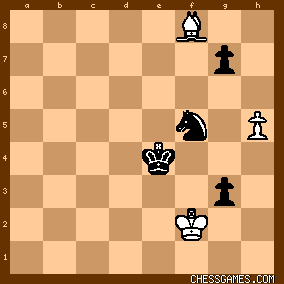
click for larger viewby playing <50.Kg1?>, he was attempting to set up what is now a well-known trick to force through his <h> pawn to queen. The trick misfired, Mackenzie had calculated the further! 50. Kg1 Kf3 51. Bxg7 Nxg7 52. h6 Nf5! 53. h7 Nd4 54. h8=Q Ne2+ 55. Kf1 g2+ 56. Ke1 g1=Q+ 57. Kd2 Qc1+ 58. Kd3 Nf4+ 59. Kd4 Qa1+ 0-1 "The accuracy, brilliancy, and depth of Capt. Mackenzie's calculations in this lovely finish are beyond all praise" (28) Game 4
Judd played a Dutch Defence and the position soon resembled trench warfare. 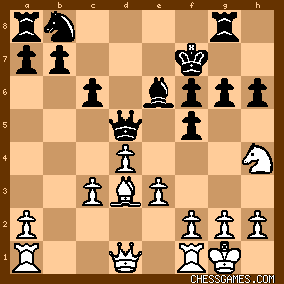
click for larger view"White misses here (move 14 - e.d.) the opportunity to establish a powerful attack. We have pointed out repeatedly the importance of carrying on operations on the Queen's flank instead of wasting time with barren attempts to storm the hostile fortress directly. This advice, however, may be followed too frequently, and to discern rightly which modus operandi is the appropriate one depends in every instance upon the judgment of the player himself. Here, we think, White would obtain speedily a decisive advantage with: 14. f3 Nd7 15. e4 fxe4 16. fxe4 Qa5 17. Qd2 Qh5 18. Rf4 Rad8 19. e5 f5 20. Qf2 &etc." (Hoffer and Zukertort) (29) Mackenzie could not gain an advantage and with a probable draw in sight played recklessly 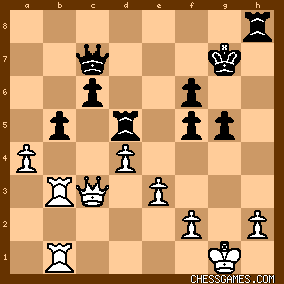
click for larger viewwith <33. axb5?> instead of the solid <33.f4>. His King was harassed across to the Queen side where it expired. "The fourth game in the Judd-Mackenzie match has been left unfinished and the match adjourned for some weeks on account of the departure of Captain Mackenzie from St. Louis on a visit to New Orleans, the birthplace and present abode of Paul Morphy." (30) This strange interruption, apparently accepted without comment by his opponent, may have been because Mackenzie had already been engaged for simultaneous displays in New Orleans prior to this match. This is further circumstantial evidence suggesting that this was to a title match. Game 5
"Capt Mackenzie has returned to St. Louis, and had played two more games with Mr. Judd, of which each scored one. The score now stands Mackenzie 3, Judd 2. Consequent on his settling down finally in St. Louis it is announced that he has undertaken the editorship of the chess column of the 'Globe Democrat', Mr. B. Foster having resigned that post in his favour. It is also stated on authority that, after his match with Mr. Judd, the captain purposes to retire from the chess arena." (31) Judd abandoned <e4> for an English Opening which came to resemble a Queen's Indian. Mackenzie, with Black, achieved a solid position. He played for the initiative on the Queen-side. Judd did not successfully blockade Mackenzie's advancing pawns and Mackenzie managed to force through a passed pawn winning the game. Game 6
Having been successful with the Dutch, Judd applied this defence again. Once again, Mackenzie failed to any advantage against his slow manoeuvring style of defence Mackenzie, still had a draw in hand when he blundered 
click for larger viewwith <37.Rf2?> allowing his opponent's Rooks to penetrate his position. After <37.h4> he could have reasonably expected a draw. Game 7
This game was the shortest of the match so far, and less than half the moves of the average for games so far. Despite a conspicuous lack of previous success Judd chose the Scotch for the third time in this match. In the opening, Judd then lost a piece by playing a routine move without properly inspecting the position. 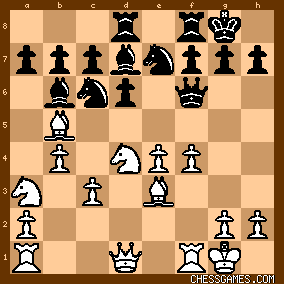
click for larger viewAfter <12.N(a)c2?> he found that his Bishop on <b5> would be subject to a revealed attack and that he had blundered away a piece. "The seventh game, a Scotch, lacks all interest. Mr. Judd opened it indifferently, and then committed on the 12th move a blunder which cost a clear piece. A dozen moves afterwards, the further loss of an exchange and resignation followed." (32) Game 8
Judd again played a Dutch Defence, but this time Mackenzie had prepared a new system. Instead of relying on the inoffensive <e3 and Bd3> systems which had so far brought him little success, he deployed a double fianchetto system. Judd played aggressively but allowed his Rook to be trapped: 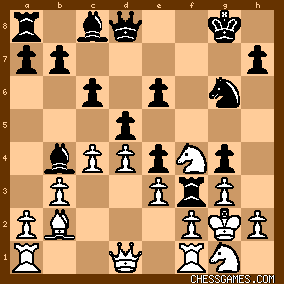
click for larger viewAt his 16th move, Mackenzie 'saw ghosts'; fearing for the safety of his King he did not take the exchange. Judd should have made more of his chances on the King-side, but eventually the opponents agreed a drawn in a blocked position. Game 9
Judd substituted the Scotch for a new opening in this match - the Ruy Lopez. Mackenzie responded aggressively with Schliemann's defence pushing forward his <f> pawn on move 3. Whether due to a momentary lapse over the board, or faulty analysis before the game, Mackenzie committed himself to a completely unsound attack with his Knight. 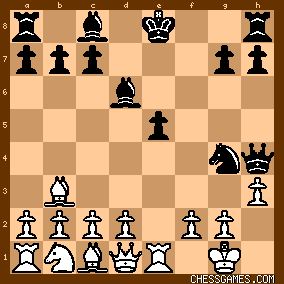
click for larger view"The first move (move 9 - e.d.) in an unsound combination: Captain Mackenzie informs us that planning the following sacrifice, he entirely overlooked the power of White's 12th move." The game continued: <10.h3> Qh4 (diag.) 11. hxg4 Bxg4 <12. Re4!> (33) Such a "coffee-house" style did not disturb his opponent who pocketed the proffered material and won efficiently. Game 10
Another Dutch Defence and Mackenzie kept faith with his new system introduced in Game 8. Mackenzie lost the game by overlooking a subtlety 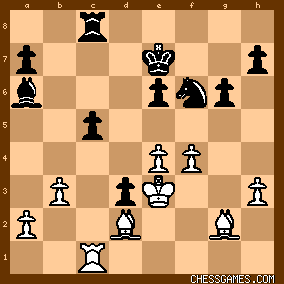
click for larger view29.Rxc5? - has Judd overlooked that if he recaptures his Rook will be skewered? No! As after: <29...Rxc5> 30. Bb4 Nd7 31. Kd4 <d2!!> (Decoy) 32. Bf3 (32. Bxd2 Rc2) and Mackenzie loses a piece. Judd was now in the lead in the match for the first time with 5½ to 4½ points. The match had reached a crescendo, all the games from this point on would be decisive. Game 11
Mackenzie again defended against the Ruy Lopez, but this time he chose a more respectable line with the Open Defence. Having equalised, Mackenzie chose a risky line opening up his King-side. Judd failed to take his opportunities, hampering himself by running short of time (34), but Mackenzie took his by forcing through passed pawns on the Queen-side to win. The scores were now equal at 5½ - 5½. Game 12
Judd defended with a French Defence. Mackenzie chose the Exchange Variation, but did not do so with the intention of a draw. In a sharp game, he developed a King-side attack and won the exchange but Judd had compensation for his loss. Staving off his opponent's attack wore heavily on Judd and he blundered allowing Mackenzie to pierce his King's defences. 
click for larger viewThe attractive and decisive <40. Rg6!!> featured in many contemporary magazines. White carries now the day by direct assault, played in Captain
Mackenzie's well-known vigorous style. (Hoffer and Zukertort) (35) Game 13
Judd was now a point behind with his opponent needing only one more victory game to take the match. He had the White pieces and played carefully in a closed Ruy Lopez. Ironically, his opponent was to give him a chance to level the match when he played aggressively but carelessly with 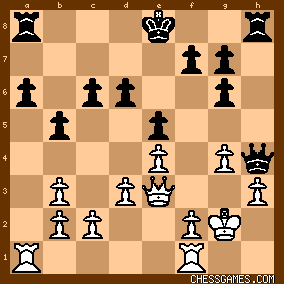
click for larger view21...g5?. Judd could have doubled his Rooks against the <a> pawn and won it: 22. Ra5 g6 23. R(f)a1 f5 24. Rxa6 Rxa6 25. Rxa6 fxg4 26. Ra8+ Kf7 27. Rxh8 Qxh8 28. hxg4 Kf6 Instead, he played defensively and lost the fleeting opportunity. In a Rook and Pawn endgame, Judd should have drawn but made a simple blunder which allowed Mackenzie to push his <f> pawn through and win the match. "Mr. Judd's play lacks energy all through this game. His faculties were impaired, we suspect, by the dangerous state of the score…" (36) "The match between Captain Mackenzie and Max Judd is concluded, the final score being: Mackenzie 7, Judd 5, and 1 draw. We congratulate the winner on his success in maintaining the position of American Champion. Great praise is likewise due to Mr. Judd, who so gallantly encountered such a formidable opponent, and kept the balance even up to nearly the close of the match." (37) Contemporary descriptions: "The present indications are that there will be an immense attendance, and that the chess room will barely hold the spectators. All are cordially invited to be present and witness the great match, which will be a notable event in the history of chess in St. Louis..." (38) "There was a magnificent attendance of chess players of the city and the vicinity, the room being filled, and all taking an absorbing interest in the match. There was no charge for admission, and a general invitation is extended to everybody to come and see the greatest contest of the kind that has ever occurred in the West." (39) "On every night of play there have been from 50-60 players as spectators and a more orderly and intelligent assemblage it has never been our lot to observe. Well known merchants and prominent citizens from all the professions were seen in attendance most of them encircled the two players and were joyful or sadly affected alternately according as their favourite secured the advantage or lost it; some were seated at other table analyzing the profound moves as they were made by the two experts, and what to us was considered laughable, a very ordinary player could often be observed to sit on judgement on the moves. On leaving, however, everyone felt he had spent not only a pleasant but a profitable time". (40) Notes
(1) "The Chess Monthly", 1881, p.198 and Game 124, p.213 (2) The "British Chess Magazine", June 1881, p.206. states that the match "terminated 30th April" (1881). (3) Paul Morphy had not played since 1858. (4) http://www.chessmetrics.com/cm/CM2/... (5) "The Chess Monthly", 1881, p.281.
Fourth game commenced Feb 24th and on the 46th move was adjourned to March 13th. Mackenzie then left St Louis Feb 26th for New Orleans. (6) The "British Chess Magazine", March 1882, p.125. (7) "The Chess Monthly", 1881, p.198.
(8)
http://www.umsl.edu/mercantile/abou... and Wikipedia article: St. Louis Mercantile Library
(9) https://en.m.wikipedia.org/wiki/Max...
(10) "New York Times", 8th March 1880, p.3.
(11) There was insufficient evidence for an absolute finding of guilt but the committee was not sufficiently convinced of Grundy's innocence to exonerate him. He never played again in any tournament of consequence, and Ware himself later experienced difficulties whilst entering for Vienna (1882) (see "British Chess Magazine", June 1882, p.213.) (12) "The Fifth American Congress", ed Charles A. Gilberg (1881), p.150-151. (13) See "The Brooklyn Daily Eagle", 8th March 1880, p.7. http://bklyn.newspapers.com/image/6...
http://web.archive.org/web/20090530... and
http://web.archive.org/web/20061027... (14) "British Chess Magazine", July 1892, p.241. (15) "Leader" (Melbourne, Australia), 2nd April 1881, p.6. (16) "Leader" (Melbourne, Australia), 2nd April 1881, p.6. (17) "Australian Town and Country Journal", (Sydney, Australia), 16th April 1881, p.29. (18) "Illustrated London News" - Saturday 4th January 1879, p.23 (19) "The Chess Monthly", 1881, Game 123, p.211. The "St. Louis Globe-Democrat", 23rd January 1881, reports the game to have lasted only "30 minutes" and to have been an "off hand game" taking place on January 15th 1881. (20) "British Chess Magazine", July 1906, p.287. (21) "British Chess Magazine" June 1892, p.241. (22) "Brooklyn Daily Eagle", 3rd March 1888
(23) The first prize at the Third American Chess Congress (1874) was $225 ("Chicago Daily Tribune", July 17th, 1874 p.3.) The first prize at the Fifth American Chess Congress (1880) was $500 ("The Fifth American Congress", e.d. Charles A. Gilberg (1881), p.502.) In 1870, the weighted mean wage of a skilled tradesman in the United States was $2.61 a day. In 1880, it was $2.26 a day (National Bureau of Economic Research: "Wages and Earnings in the United States, 1860-1890: Wages by Occupational and Individual Characteristics" - see http://www.nber.org/chapters/c2500.... ).Assuming 6 paid days a week = 312 days - 6 Federal (assumed unpaid) holidays and 51 unpaid Sundays (assuming one day to be coincidental with a Federal holiday) = 255 working days a year. 255 x $2.61 = $665.55 p.a. or $55.46 per month.
255 x $2.26 = $576.30 p.a. or $48.03 per month.
In comparison, the manager of "Hunter & Springer's" pig iron furnaces in Chambersberg, Pennsylvania earned $170 a month ("Report on the statistics of wages in manufacturing industries", Jos. D. Weeks. Department of the Interior, (1886), p.133). See https://babel.hathitrust.org/cgi/pt... (24) "Leader", (Melbourne, Australia), 11th June 1881, p.6. (25) "Australian Town and Country Journal", (Sydney, Australia), 23rd April 1881, p.29 - with notes by Mackenzie (26) "Australian Town and Country Journal" (Sydney, Australia), 15th October 1881, p.29. (27) "Australian Town and Country Journal (Sydney, Australia) 16th April 1881, p.29. (28) "British Chess Magazine", June 1881, p.168. (29) "The Chess Monthly", 1881, p.271.
(30) "The Chess Monthly", 1881, p.231.
(31) "Leader" (Melbourne, Australia), 28th May 1881, p.6. (32) "The Chess Monthly", 1881, p.302.
(33) "The Chess Monthly", Game 140, notes on p.304. (34) "The Chess Monthly", 1881, p.338.
(35) "The Chess Monthly", 1881, Game 149, p.341. (36) "The Chess Monthly", 1881, p.342.
(37) "The Chess Monthly", 1881, Game 149, p.294. (38) "St. Louis Globe-Democrat", 30th January 1881. (39) "St. Louis Globe-Democrat", 6th February 1881. (40) "St. Louis Globe-Democrat", 13th February 1881. Contemporary sources for the games The following are scores I could access on-line. They do not represent an exhaustive list of all the relevant reports. Nearly all sources attribute the scores to the <"St. Louis Globe-Democrat"> and make heavy use of its material. This was a daily newspaper based in St. Louis from 1852 until its closure in 1986. Its archive, whilst preserved at The Saint Louis Mercantile Library at the University of Missouri-St. Louis, is not yet available on-line. The chess columns of the <"St. Louis Globe-Democrat">, however, have been put on-line by Joost van Winsen at the "Chess Archaeology" web-site:
http://www.chessarch.com/excavation... The dates of the games are difficult to determine, it is obvious that the original schedule was abandoned and it appears that several weeks were lost with Mackenzie's visit to New Orleans half way through game 4. Game One opened and was adjourned on Monday 31st January and was completed on Saturday 5th February. Game Two opened and was adjourned on Monday 7th February and was completed on Tuesday 8th February. Game Three opened and was adjourned on Saturday 19th February and was completed on Monday 21st February 1881. Game Four opened and was adjourned on Thursday 24th February and was completed on Sunday 13th March. Mackenzie left for New Orleans on Saturday 26th February. ("British Chess Magazine, April 1881, p.125 ") Game Thirteen The match concluded on Saturday 30th April 1881 ("British Chess Magazine", June 1881, p.206.) <Game 1>
(1). "The Chess Monthly", 1881, p.198 states:
"First match game, played on the 31st of January and 5th of February, 1881". The game score is given in "The Chess Monthly", Game 124 p.213 (2). "British Chess Magazine", April 1881, p.125. (3). "New York Clipper, 2nd April 1881" p.25.
(4). "Australian Town and Country Journal (Sydney, Australia), 15th October 1881, p.29. Game 2
(1). "The Chess Monthly", 1881, Game 126 p.240.
Played on the 7th and 8th February 1881, "The Chess Monthly", 1881, p.198. (2)."British Chess Magazine", April 1881, p.128. (3). "Leader" (Melbourne, Australia), 23rd April 1881, p.6. with notes by Judd, played on the 6th and 12th February. http://trove.nla.gov.au/newspaper/a... Game 3
(1). "The Chess Monthly", 1881, Game 127 p.243 - "Third match game, played on the 19th and 21st of February, at the Mercantile Library Chess Room, St. Louis." (2). "British Chess Magazine", June 1881, p.168. Game 4
(1). "The Chess Monthly", 1881, Game 131 p.270.
(2). "New York Clipper, 30th April 1881" p.92.
http://idnc.library.illinois.edu/cg... Game 5
(1). "The Chess Monthly", 1881, Game 132 p.272.
(2). "British Chess Magazine", July 1881 p.206.
Game 6
(1). "The Chess Monthly", 1881, Game 138 p.299.
(2). "British Chess Magazine", July 1881, p.241. Game 7
The game score not given by "The Chess Monthly". "The seventh game, a Scotch, lacks all interest. Mr. Judd opened it indifferently, and then committed on the 12th move a blunder which cost a clear piece. A dozen moves afterwards, the further loss of an exchange and resignation followed." "The Chess Monthly", 1881, p.302. Game 8
(1). "The Chess Monthly", 1881, Game 139, p.301. Game 9
(1). "The Chess Monthly", 1881, Game 140, p.303. (2). "British Chess Magazine", November 1881, p.349. (3). "Leader" (Melbourne, Australia), 9th July 1881, p.6. http://trove.nla.gov.au/newspaper/a... Game 10
(1). "The Chess Monthly", 1881, Game 141, p.304. (2). "Leader" (Melbourne, Australia), 9th July 1881, p.6. Game 11
(1). "The Chess Monthly", 1881, Game 148, p.337. (2). "British Chess Magazine", July 1881, p.243. Game 12
(1). "The Chess Monthly", 1881, Game 149, p.339. (2). "British Chess Magazine", November 1881, p.349. (3). "New York Clipper", 30th July 1881, p.300. Game 13
(1). "The Chess Monthly", 1881, Game 150, p.341.
| 


